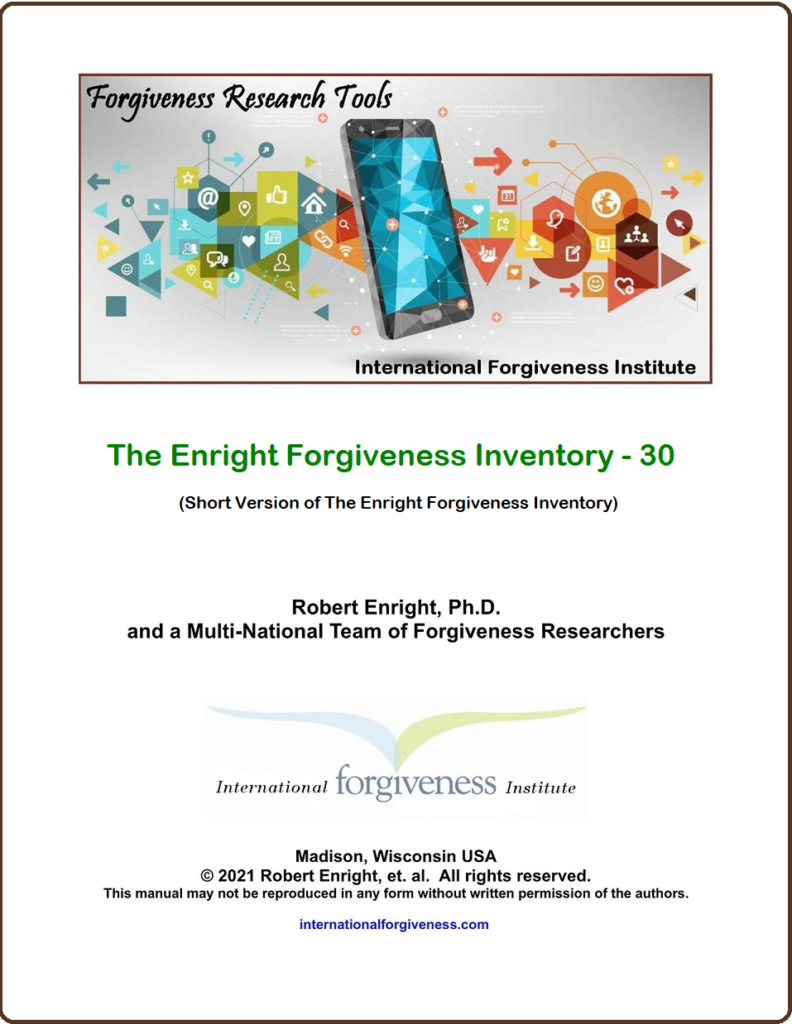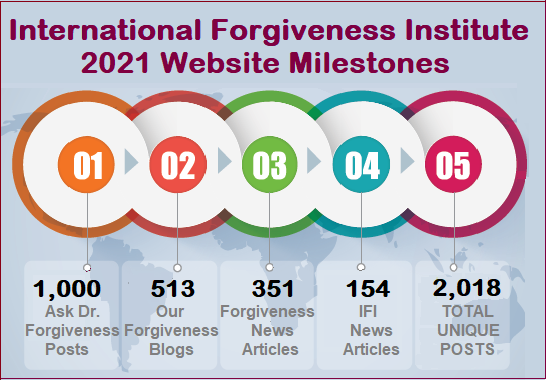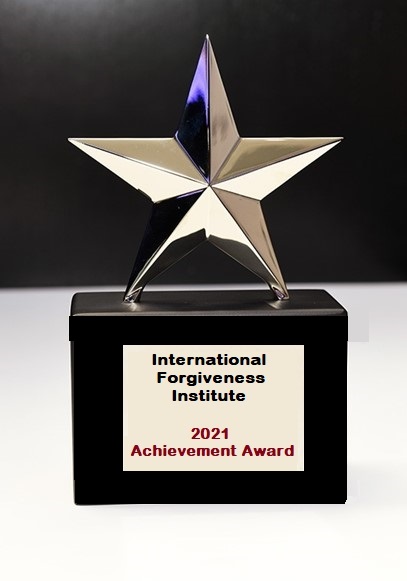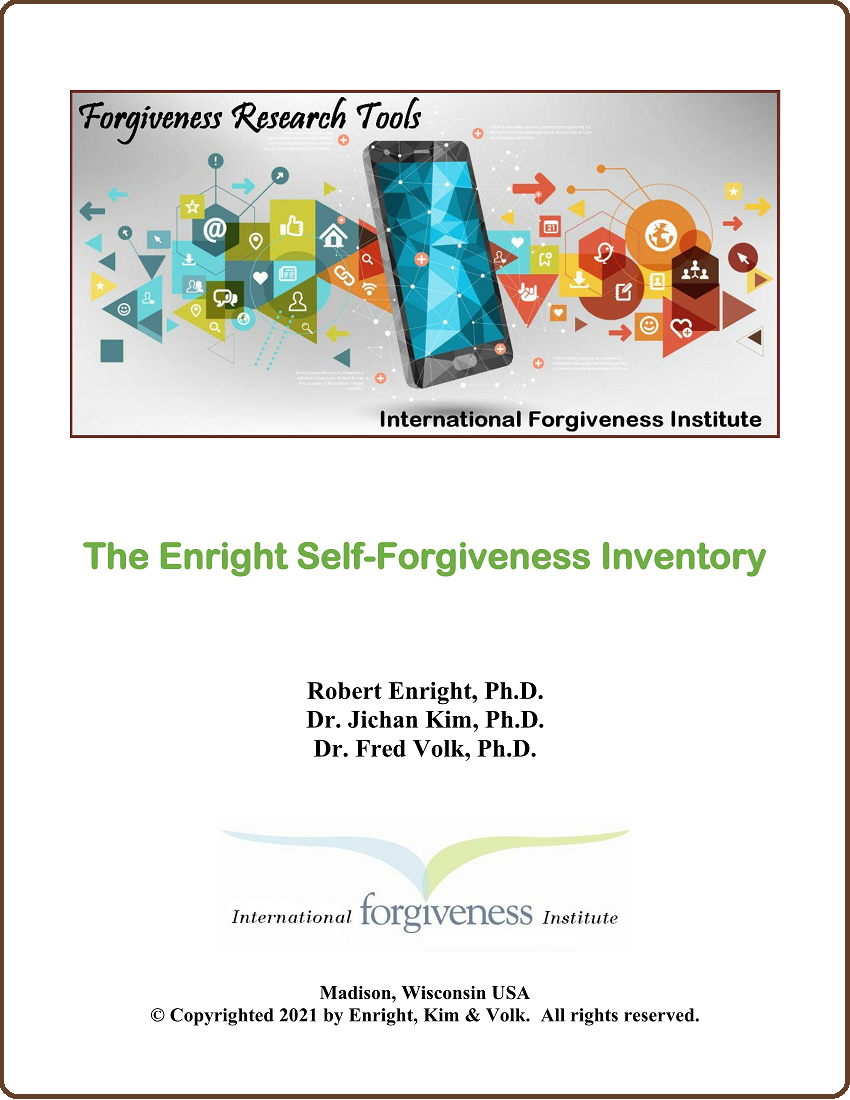Tagged: “Research Tools”
ENRIGHT FORGIVENESS INVENTORY, A STANDARD MEASUREMENT TOOL USED AROUND THE WORLD, NOW AVAILABLE IN SHORTER VERSION
An eight-nation study designed to test the applicability and sensitivity of the new short form of the Enright Forgiveness Inventory, the EFI-30, has demonstrated that the new instrument is a reliable and valid research tool that can be used across widely diverse cultures.
The Enright Forgiveness Inventory-30 (EFI-30) is a shorter version of the Enright Forgiveness Inventory for Adults (EFI) that was the first forgiveness measurement tool developed by Dr. Robert Enright and his Human Development Study Group at the University of Wisconsin-Madison. The EFI is an objective measure of the degree to which one person forgives another who has hurt him or her deeply and unfairly. 
After its development in 1995, the EFI quickly became a central component of forgiveness research both in the U.S. and internationally. It has been translated from English (original language) into Brazilian-Portuguese, Chinese, German, Hebrew, Korean, Dutch, and other languages. Its reliability and validity have been exhibited in Master’s theses, doctoral dissertations, and empirical articles published around the world.
The new study, Validating the Enright Forgiveness Inventory-30, was published this month in the European Journal of Psychological Assessment. It outlines the process and rationale used by the study’s authors to create a shorter version of the EFI (30 items instead of the original 60) that could convey the same meaningful information on the degree of interpersonal forgiveness across the domains of affect, behavior, and cognition. In other words, they developed a smaller, less time-consuming scale that is still accurate and reliable.
Data from the U.S. were used in the creation of the new measure and applied to seven other countries: Austria, Brazil, Israel, South Korea, Norway, Pakistan, and Taiwan. Results from the study provided the psychometric evidence for the reduced version of the EFI-30 across cultures. (NOTE: psychometrics is the branch of psychology that deals with the design, administration, and interpretation of quantitative tests for the measurement of psychological variables such as intelligence, aptitude, and personality traits.)
“While the EFI is particularly relevant when it accurately assesses people with low degrees of forgiveness,” Dr. Enright said in comparing the two research tools, “the EFI-30 has still demonstrated its effectiveness to distinguish particular cultural social norms that apply to the behavioral expression of forgiveness.”
According to Dr. Enright, the new EFI-30 tool is suitable to verify affective, behavioral, and cognitive changes in people who choose forgiveness for improvement of their well-being. He adds that it is designed to assess six psychological stances of victims toward offenders: positive affect, negative affect, positive behavior, negative behavior, positive cognition, and negative cognition.
The EFI-30 and other highly-regarded forgiveness research tools developed by Dr. Enright, co-founder of the International Forgiveness Institute (IFI), are now available absolutely free to any forgiveness researcher who requests them. To learn more about the tools, see the IFI website article Coveted Forgiveness Research Tools Now Available at No Cost. To request Research Tools for your own use, see Dr. Enright’s Forgiveness Research Tools.
“The World’s Largest Portal to Anything and Everything Forgiveness-Related”
“Ask Dr. Forgiveness” is a dedicated column on the IFI website where users can ask questions related to even the toughest forgiveness topics and receive an informed response directly from IFI co-founder Dr. Robert Enright who is often referred to as “Dr. Forgiveness.” It is the IFI’s most popular website component and has garnered questions from individuals across the globe who are seeking answers and information on forgiveness-related topics.
As illustrated in the info-graphic at right, the IFI’s “Our Forgiveness Blog” section contains the second-highest number of website entries. Every one of the 513 entries in that section has been personally written by Dr. Enright (with the exception of a few guest blogs from prominent forgiveness advocates).
personally written by Dr. Enright (with the exception of a few guest blogs from prominent forgiveness advocates).
Those IFI followers who track Dr. Enright’s blogs have learned about the wit and wisdom of his 35-years pursuing scientific forgiveness research, the meticulous validation of his scientific procedures, his prominent international role in creating forgiveness education curricula, and his dominance in developing forgiveness therapy interventions.
In addition to those 500+ essays on the IFI website, Dr. Enright has also authored 86 additional blogs for his column called “The Forgiving Life” that runs monthly in the magazine Psychology Today. That publication, which focuses on mental health and behavioral science issues, established its partnership with Dr. Enright more than five years ago.
“The 2,000+ milestone we just reached with our blog and news sections is a hugely significant accomplishment,” according to Dr. Enright. “Compared to other websites that focus on moral development, the IFI website is by far the world’s largest portal to anything and everything forgiveness-related.”
 Part of the reason Dr. Enright can make that claim is because of his life-long aspiration to share the unvarnished results of his scientific research and interventions with not only interested scholars but with other psychologists, psychotherapists, and, essentially, the entire world.
Part of the reason Dr. Enright can make that claim is because of his life-long aspiration to share the unvarnished results of his scientific research and interventions with not only interested scholars but with other psychologists, psychotherapists, and, essentially, the entire world.
That’s why the IFI website now contains the full texts of many research documents produced by Dr. Enright and his research teams (available at no cost). Additionally, the site contains the full documentation (including instructions and scoring algorithms) for the most popular research tools Dr. Enright created during his career (again, available at no cost). In just the past three weeks, those tools have been accessed by scientists and clinicians from 21 different US states and 17 foreign countries.
“We provide all those resources on our website because we want to expand the availability of crucial forgiveness knowledge,” Dr. Enright says. “Our goal is to reach across continents to help satisfy man’s innate curiosity about forgiveness and to help disseminate the good news about the abundant benefits of the virtue of forgiveness.”
Coveted Forgiveness Research Tools Now Available at No Cost
The man Time magazine has called “the forgiveness trailblazer” is blazing forward in a new direction by offering to social science and moral development researchers around the world the accumulation of forgiveness research tools he has developed over the past 35 years. And he is giving them away at no cost and with no strings attached.
Dr. Robert Enright, co-founder of the International Forgiveness Institute (IFI), announced today that he is now providing his highly regarded scientific research tools absolutely free to any forgiveness researcher who requests them.
“This initiative is designed to help expand and broaden the growing collection of crucial forgiveness knowledge,” Dr. Enright says. “This area of moral development has already had significant impacts in the realms of education, medical treatment, and emotional therapy, so why not try to expand on that?”
 Often introduced as “Dr. Forgiveness” because of his 35-year academic commitment to researching and implementing forgiveness programs, Dr. Enright is acknowledged as the unquestioned pioneer in the scientific study of forgiveness. The research tools he and his associates have developed have become highly coveted tools because of his meticulous validation of the scientific procedures he employs.
Often introduced as “Dr. Forgiveness” because of his 35-year academic commitment to researching and implementing forgiveness programs, Dr. Enright is acknowledged as the unquestioned pioneer in the scientific study of forgiveness. The research tools he and his associates have developed have become highly coveted tools because of his meticulous validation of the scientific procedures he employs.
All of Dr. Enright’s research is done in conjunction with the University of Wisconsin-Madison where he is a Professor of Educational Psychology. You can access his peer-reviewed empirical studies, research abstracts, and published studies at Forgiveness Research.
In addition to sharing his research results, Dr. Enright is now making available his user-validated forgiveness research tools at no cost. Those tools include:
- The Enright Forgiveness Inventory-30 (EFI-30) – This tool is a shorter version of the Enright Forgiveness Inventory for Adults that has become the interpersonal forgiveness measure of choice for research professionals in the U.S. and abroad since its development in 1995. The EFI-30 reduces the number of items from 60 to 30 for the purpose of a more practical assessment of this construct. Data from the United States were used in the creation of the new measure and applied to seven nations: Austria, Brazil, Israel, Korea, Norway, Pakistan, and Taiwan to develop its psychometric validation.
. - The Enright Self-Forgiveness Inventory (ESFI) – This measure is based on the conceptualization of forgiveness as a moral virtue. The ESFI is a 30-item scale featuring six subscales with five items each. Five additional items at the end of the scale allow for measurement of pseudo self-forgiveness (PSF). Although several competing self-forgiveness measures exist, Dr. Enright’s is the only one that captures the idea that self-forgiveness is a moral virtue that includes behavior toward the self.
. - The Enright Group Forgiveness Inventory (EGFI) – Newly validated and published earlier this year, the EGFI has 56 items across seven subscales with each subscale having eight items. Those subscales measure a group’s motivation and values regarding forgiveness, peace, and friendliness toward the other group. Like the ESFI, it also has a PSF component and has dramatic implications for its ability to enhance peace efforts in the world.
.
To develop and validate the EGFI, Dr. Enright worked with a team of 16 international researchers who collected data from 595 study participants in three different geographic and cultural settings of the world—China and Taiwan, Slovenia, and the US. The study team’s findings documented that this new measure has strong internal consistency as well as convergent and discriminant validity.
. - The Enright Forgiveness Inventory for Children (EFI-C) – The EFI-C is an objective measure of the degree to which a child forgives another who has hurt him or her deeply and unfairly. It is a 30-item scale similar to the 60-item adult version and is presented orally to very young children and in writing to those who can read well. Thanks to a researcher in Pakistan, the EFI-C is now available in the Urdu language—the native language of an estimated 230 million people, primarily in South Asia.
Dr. Enright is the author or editor of seven books. He published the first social scientific journal article on person-to-person forgiveness and the first cross-cultural studies of interpersonal forgiveness. He also pioneered scientific studies of forgiveness therapy and developed an early intervention to promote forgiveness–the 20-step Process Model of Forgiving.
By publicly sharing all his research studies and results in more than 100 publications over the years, Dr. Enright has earned recognition as being in the forefront of the science of forgiveness. The Los Angeles Times described Dr. Enright as “the guru of what many are calling a new science of forgiveness.” The Christian Science Monitor called him “the father of forgiveness research.”
Learn more about Dr. Enright’s free tools on the Forgiveness Research Tools page.
I would like to know and learn more about forgiveness. What self help books and resources can you suggest? I have been on my own forgiveness journey for a while now. The biggest challenge has been learning how to forgive my husband fully for hurting me and my family.
I would recommend any one of these 3 self-help books, which describe our Process Model of Forgiveness, which has been scientifically-tested and found to be effective:
Forgiveness Is a Choice (2001)
The Forgiving Life (2012). This is my most in-depth self-help book because it links forgiving to the moral virtue of agape love. This book is a Socratic dialogue between two women.
8 Keys to Forgiveness (2015)
I wish you the best on your healing journey.
How can I bring forgiveness resources to schools?
We have developed Forgiveness Education Curriculum Guides for teachers and parents. These guides run from pre-kindergarten (age 4) through the end of high school (age 18). All of these guides are described here on our International Forgiveness Institute website, in the Store section. You can read some of our scientifically-tested school programs here as well by going to the Forgiveness Education section. At the dropdown menu, select Research. That will bring you to a page with some of our Forgiveness Therapy research (presented first) and our Forgiveness Education research. I am here to help if you want to approach schools on this vital issue of forgiveness education.



